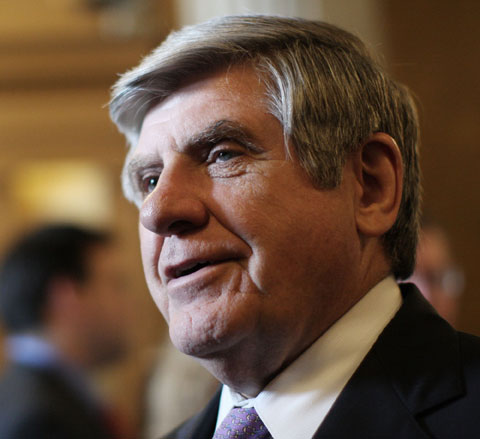Senate Rejects Abortion Restriction Amendment
The move was cheered by abortion rights advocates, but it may have eroded the support of some moderate Democrats for the underlying bill -- leaving questions about whether another abortion provision will emerge later in the Senate debate.
Jul 31, 2020108.8K Shares1.4M Views
Sen. Ben Nelson (D-Neb.)
The Senate on Tuesday rejected an amendment to health-care reform legislation that would have placed strict new limits on women’s access to abortion coverage. The move was cheered by abortion rights advocates, but it may have eroded the support of some moderate Democrats for the underlying bill — leaving questions about whether another abortion provision will emerge later in the Senate debate.
The count was 54 to 45to table the amendment, with seven Democrats (all men) supporting the measure and two Republicans (both women) opposing it.
[Congress1]Few issues pack more emotional wallop than that of abortion, which has emerged in recent weeks as the most contentious single provision of the most contentious single bill to be considered by Congress this year. And Tuesday’s vote by no means marks the end of the debate on the topic. Indeed, a similar amendment, sponsored by Rep. Bart Stupak (D-Mich.), passed the House last month, setting the stage for a clash between House and Senate Democrats when they meet to iron out the differences between their bills. (If, that is, abortion foes don’t first alter the Senate bill with some other provision restricting abortion coverage.) **
**
Sponsored by Sens. Ben Nelson (D-Neb.) and Orrin Hatch (R-Utah), the provision would have prohibited those insurance plans receiving federal subsidies from offering elective abortion coverage. By contrast, the Senate health reform bill, pieced together by Senate Majority Leader Harry Reid (D-Nev.), would allow subsidized plans to offer abortion coverage as long as the companies separated the federal money from the out-of-pocket contributions of patients. Only the private funds, under Reid’s bill, could be used for abortion services.
Supporters of Reid’s bill argue that it strikes the right balance between ensuring comprehensive coverage for women and preserving the decades-old ban on federal funding for abortions, passed in 1976 in the form of the Hyde amendment. Exceptions to the funding prohibition are made in cases of rape, incest or when the mother’s life is threatened by the pregnancy.
“Divisive issues do not have to divide us,” said Reid, who has a long historyof opposing abortion rights. “We found a fair middle ground.”
Supporters of the Nelson-Hatch amendment didn’t see it that way. The Reid bill, Nelson argued, “goes around the federal standard disallowing public funding of abortion.”
Because money is fungible, the abortion foes said, the act of distinguishing between public and private contributions is meaningless. “How do you segregate those funds?” asked Sen. Mike Johanns (R-Neb.), a co-sponsor of the amendment. “It’s impossible.”
Supporters of the Nelson-Hatch amendment have argued that women could still purchase abortion coverage by choosing to buy a separate insurance plan, or “rider,” to supplement their underlying plan. Yet supporters of abortion rights pointed out that abortions aren’t services that women tend to plan for in advance.
“No woman expects to need an abortion,” said Sen. Jeanne Shaheen (D-N.H.).
Some lawmakers charged that the Nelson-Hatch provision was nakedly discriminatory. “It singles out our daughters and legislates limits on their reproductive health, their reproductive rights,” Sen. Robert Menendez (D-N.J.) said just before Tuesday’s vote. “If we were to single out men’s reproductive health in this legislation, imagine the outcry.”
Special interest groups have also jumped into the fray. Abortion-rights advocates have argued that the Nelson-Hatch provision goes well beyond the Hyde restrictions, preventing women from accessing comprehensive health coverage even when they use their own money to do it. “Health care reform is meant to guarantee quality, affordable health care coverage for all, not take benefits away from American women,” Cecile Richards, president of Planned Parenthood Federation of America, said in a statement.
But conservative groups rallied squarely behind the Nelson-Hatch provision, with some issuing statements reflecting the emotionally charged nature of the abortion debate. Charmaine Yoest, president and CEO of the anti-abortion group Americans United for Life Action, this week called the Reid bill a bailout for Planned Parenthood.
“Their lobbying efforts are said to be about empowering women and advancing reproductive health,” Yoest said in a statement, “but the bottom line is that Planned Parenthood needs the business.”
Tuesday’s vote came as Senate leaders are rushing to pass their health reform bill before Christmas — a timeline threatened by the host of amendments being offered on both sides of the aisle.
The abortion debate is hardly over. Nelson has indicated that he would oppose the Reid bill without some restrictive abortion language. Yet asked before Tuesday’s vote if he could support a provision that differs from his own, the Nebraska moderate seemed to ease his position a bit.
“I have trouble imagining what it would be,” he said. “There are other people with great imaginations, so perhaps they’ll come up with something.”
Whatever happens, no one on Capitol Hill is under the delusion that the health reform bill will mend any fences in the divisive battle over abortion rights.
“We are not going to resolve this issue today,” said Sen. Richard Durbin (D-Ill.). “Not with this amendment, and not with this bill.”

Rhyley Carney
Reviewer
Latest Articles
Popular Articles
